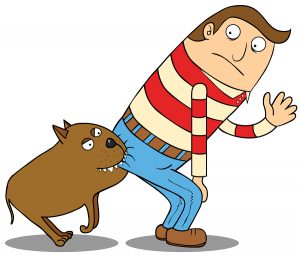The Strict Liability Distinction
 Michael Babboni
Personal Injury
For the most part, personal injury cases are all about discovering who is at fault, or liable, for the injury in question. If the act is intentional and malicious, then finding fault is easy, and since malicious, harmful acts are usually illegal all the real action will happen in the criminal case that goes along with it. If the act is accidental or the injury happens due to negligence, then the civil case will stand alone.
Michael Babboni
Personal Injury
For the most part, personal injury cases are all about discovering who is at fault, or liable, for the injury in question. If the act is intentional and malicious, then finding fault is easy, and since malicious, harmful acts are usually illegal all the real action will happen in the criminal case that goes along with it. If the act is accidental or the injury happens due to negligence, then the civil case will stand alone.However, there are times when a civil defendant is not at fault but can still be held liable, and when this happens it’s called strict liability.
The Definition
In the military, it’s commonly held that an officer is responsible for the actions of his or her subordinates, even if that subordinate should happen to act against orders. The officer should have trained out such insubordination in the first place, or so the justification goes.
The way strict liability works is very similar to this. A company, landowner, or pet owner may not be directly to blame, and he or she may have taken every reasonable precaution against accidents and other unfortunate events, but if the doctrine of strict liability applies then he or she will still be held liable for damages.
It’s because of strict liability that businesses and corporations can be held to account for defective products or unruly employees even if they didn’t do anything wrong at the management level. It’s also how personal injury lawyers can get full compensation for a client even if the employee directly at fault doesn’t make enough money to fully pay the client’s medical bills.
An Example
In Florida (as in the other 49 states), a manufacturer can be held strictly liable without fault for defective products, as can the other companies along the product’s distribution chain. All a plaintiff needs to prove is:
- That a product is defective because of poor design, poor manufacturing, or inadequate warnings,
- That the defect creates an “unreasonably dangerous” situation,
- That the manufacturer and distributors are related to the defective product (so you aren’t trying to pin the blame on the wrong people),
- And that the defect is positively responsible for the plaintiff’s injuries.
As an example, let’s look at the wrongful death cases surrounding GM’s faulty ignition switches. For these cases, the most important matter was to prove that the ignition switches could pop out of drive on their own and prove that because they did so at just the wrong moment, people were hurt and died. The fact that at least some of GM’s employees knew about the fault and said nothing likely increased how much juries did and are awarding victims and survivors, but GM lost the case as soon as the plaintiffs proved the switches were defective.
Florida also has strict liability when it comes to pets and dog bites. Even if a dog has been peaceful for every day of its life before biting someone, the owner can be held completely liable. There are certain exceptions to this, such as posting “Beware of Dog” warnings around the fenced-off area where your dog lives, but for the most part if a dog bites or a cat scratches a person in Florida, the owner will be held liable.
If you’ve suffered a personal injury or been in a car accident in or around St. Petersburg, Florida, then you should contact the St. Pete Lawyer. I’ve been living and practicing in this town for over 27 years, and I can provide you with a free case review so you know where you stand regarding negligence, fault, and strict liability. And if you need a personal injury lawyer’s help, I’ll do everything I can to get you the compensation you deserve.
